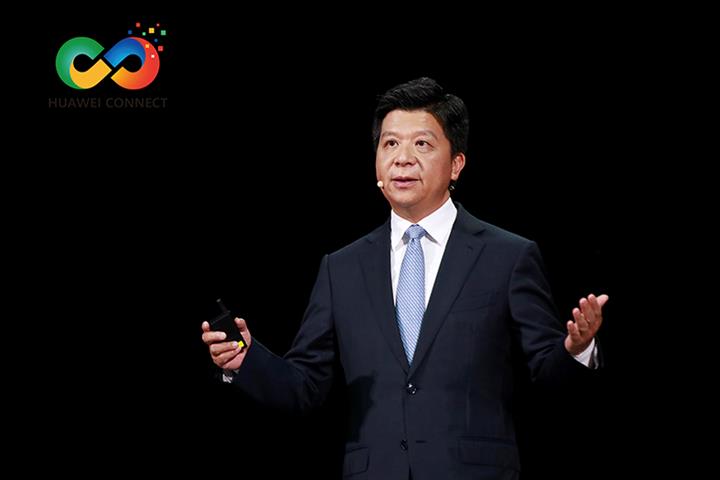 Huawei Will Continue to Use US Semiconductor Equipment, Chips If Ban Is Lifted, Chair Says
Huawei Will Continue to Use US Semiconductor Equipment, Chips If Ban Is Lifted, Chair Says(Yicai Global) Sept. 23 -- Huawei Technologies is willing to continue to adopt US semiconductor equipment and chip solutions if the US lifts its trade ban, the Chinese telecoms giant's rotating chairman said today.
Huawei has been the subject of an increasingly stringent series of trade bans from the US government over the past year and a half. The sanctions on Huawei will not only affect Huawei itself, but will be disastrous to global industrial supply chains, Guo Ping said at the Huawei Connect 2020 event being held in Shanghai from Sept. 23 to Sept. 26.
"The US sanctions not only restrict Huawei and the supply of parts by non-US companies to Huawei. They also greatly affect US companies' chip sales and are causing economic losses of several trillion yen to Japan," Guo said.
The US government placed Huawei on its so-called Entity List last May over national security concerns, barring US companies from buying its products and from selling it their hardware and software.
In May, the US tightened the noose to include semiconductors not only made in the US but also those manufactured in other countries using US software and technology, inflicting great damage on the Shenzhen-based firm's global supply chain.
The Bureau of Industry and Security then added further restrictions last month to prevent any form of transaction with a firm on the Entity List that acts as purchaser, intermediate, ultimate consignee or end-user of Huawei parts and products, without a specific license.
The third round of restrictions has greatly affected the company's production and operations, Guo said. Huawei has rushed to stockpile and its chip reserves for its telecoms business should be sufficient.
Excerpts from Wang Tao, Huawei executive director and chairman of the Investment Review Board, and Guo's responses to questions from the media are given below:
Q: How long can Huawei's chip reserve last?
Guo: The latest sanction has brought great difficulties to our production and operations. We only began to store items in our warehouses in the middle of this month.
Q: How will the US' 5G Clean Path initiative, which does not use any equipment from vendors it regards as untrustworthy, affect Huawei's global sales and the layout of its 5G business? Is the recent news of layoffs and investment reductions in Australia true?
Wang: The 5G Clean Path has not had a clear impact on our 5G business. We focus more on technology and solutions to create more value.
Australia is a small market and has never been our focus. We will use our limited resources to serve customers who really need us.
Q: Has Huawei considered layoffs to deal with the crisis?
Guo: Huawei's human resources policy has not changed. The company will maintain a stable business and continue to recruit talent. It will adjust this policy according to the business performance in individual markets.
Q: California-based Qualcomm is applying for a US license. Would you consider using Qualcomm chips? Have you got any plans to invest in chip manufacturing plants?
Guo: We have been buying chips from Qualcomm for the past decade. I have noticed that Qualcomm is applying to the US government for an export license. Should it be granted, we are willing to continue using Qualcomm chips. Huawei is willing to help credible manufacturers, materials makers and other sections of the supply chain, since to help them is to help ourselves.
Editor: Kim Taylor